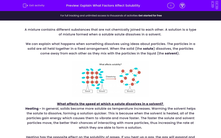A mixture contains different substances that are not chemically joined to each other. A solution is a type of mixture formed when a soluble solute dissolves in a solvent.
We can explain what happens when something dissolves using ideas about particles. The particles in a solid are all held together in a fixed arrangement. When the solid (the solute) dissolves, the particles come away from each other as they mix with the particles in the liquid (the solvent).
.png)
What affects the speed at which a solute dissolves in a solvent?
Heating - In general, solids become more soluble as temperature increases. Warming the solvent helps the solute to dissolve, forming a solution quicker. This is because when the solvent is heated, all of the particles gain energy which causes them to vibrate and move faster. The faster the solute and solvent particles move, the better their chances of interacting with more particles, thus increasing the rate at which they are able to form a solution.
Heating has the opposite effect on the solubility of gases. If you heat up a gas, the gas will expand and escape from their solvent, decreasing their solubility.
Are you happy with all that?
Let's try some questions on temperature and solubility.








